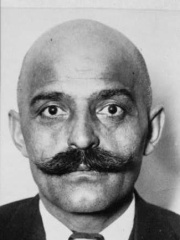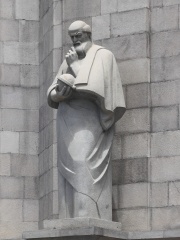

The Most Famous
PHILOSOPHERS from Armenia
This page contains a list of the greatest Armenian Philosophers. The pantheon dataset contains 1,267 Philosophers, 2 of which were born in Armenia. This makes Armenia the birth place of the 50th most number of Philosophers behind Georgia, and Saudi Arabia.
Top 2
The following people are considered by Pantheon to be the most legendary Armenian Philosophers of all time. This list of famous Armenian Philosophers is sorted by HPI (Historical Popularity Index), a metric that aggregates information on a biography's online popularity.

1. George Gurdjieff (1866 - 1949)
With an HPI of 78.45, George Gurdjieff is the most famous Armenian Philosopher. His biography has been translated into 50 different languages on wikipedia.
George Ivanovich Gurdjieff (c. 1866–1877 – 29 October 1949) was a philosopher, mystic, spiritual teacher, composer, and movements teacher. Born in the Russian Empire, he briefly became a citizen of the First Republic of Armenia after its formation in 1918, but fled the impending Red Army invasion of Armenia in 1920, which rendered him stateless. In the early 1920s, he applied for British citizenship, but his application was denied. He then settled in France, where he lived and taught for the rest of his life. Gurdjieff taught that people are not conscious of themselves and thus live their lives in a state of hypnotic "waking sleep", but that it is possible to awaken to a higher state of consciousness and serve our purpose as human beings. His student P. D. Ouspensky referred to Gurdjieff's teachings as the "Fourth Way". Gurdjieff's teaching has inspired the formation of many groups around the world. After his death in 1949, the Gurdjieff Foundation in Paris was established and led by his close pupil Jeanne de Salzmann in cooperation with other direct pupils of Gurdjieff, until her death in 1990; and then by her son Michel de Salzmann, until his death in 2001. The International Association of the Gurdjieff Foundations comprises the Institut Gurdjieff in France; The Gurdjieff Foundation in the USA; The Gurdjieff Society in the UK; and the Gurdjieff Foundation in Venezuela.

2. Anania Shirakatsi (610 - 685)
With an HPI of 66.17, Anania Shirakatsi is the 2nd most famous Armenian Philosopher. His biography has been translated into 30 different languages.
Anania Shirakatsi (Old Armenian: Անանիա Շիրակացի, Anania Širakac’i, anglicized: Ananias of Shirak) was a 7th-century Armenian polymath and natural philosopher, author of extant works covering mathematics, astronomy, geography, chronology, and other fields. Little is known for certain of his life outside of his own writings, but he is considered the father of the exact and natural sciences in Armenia—the first Armenian mathematician, astronomer, and cosmographer. A part of the Armenian Hellenizing School and one of the few secular scholars in medieval Armenia, Anania was educated primarily by Tychicus, in Trebizond. He composed science textbooks and the first known geographic work in classical Armenian (Ashkharhatsuyts), which provides detailed information about Greater Armenia, Persia and the Caucasus (Georgia and Caucasian Albania). In mathematics, his accomplishments include the earliest known table of results of the four basic operations, the earliest known collection of recreational math puzzles and problems, and the earliest book of math problems in Armenian. He also devised a system of mathematical notation based on the Armenian alphabet, although he was the only writer known to have used it.
People
Pantheon has 2 people classified as Armenian philosophers born between 610 and 1866. Of these 2, none of them are still alive today. The most famous deceased Armenian philosophers include George Gurdjieff, and Anania Shirakatsi.

